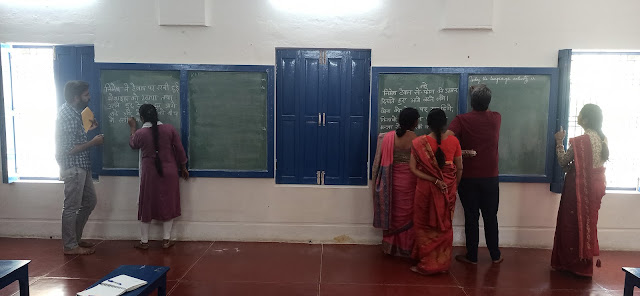Together, learning languages
Learning languages together
This piece finds place in
the Deccan Herald. Thanks to the team there.
Thanks are due to
colleagues for being together during the journey, the questions, and sharing not
only confusions but also memories.
Thanks Richa for the comment on the draft.
Some time back we
initiated capacity building sessions for teachers at our school. These sessions
focus on English and Hindi; languages. 10
out of the 15 teachers at the school teach languages; they are the
participants. Our school is located in peri-urban eastern Uttar Pradesh; these
teachers converse in Bhojpuri.
Today, while it is not
easy to pinpoint what has worked and what has not gone right, it is not
difficult either to discern the positive energy these sessions have or the
learning they enable. Looking back and gleaning through the journey is fun; we
have experienced more learning, more surprises than we had bargained for.
Sessions.
Together the 11 of us
walked the language path. From magazine articles to poetry, from newspaper
columns to short stories and from textbooks to wordless books. During these
proverbial walks we explored reading as well as writing, in both – Hindi and
English. We also experimented – be it reading packaging of items at school, from
pencils to biscuits, or undertaking book reviews jointly.
These sessions, slowly
evolved from events into a process; a regular and scheduled activity like other
actions at the school. Like it often happens during hikes, and treks, this
walking, albeit with languages, appeared easier prior to or just after the beginning.
And, as we delved deeper, during the sessions, the difficulties began to sink
it. Together we overcame the frustrations. English and Hindi getting together
led to more than a few fun moments and we also laughed together. To quote Basil
Lanneau Gildersleeve, ‘It is astonishing how much enjoyment one can get out
of a language that one understands imperfectly’.
As the sessions progressed,
the importance of appropriate ambience, or mahaul, was underscored. Informality
and humour, in generous doses, were crucial. Informality that brings in ease in
the room, and humour that neither depicts anyone in a low light nor creates a
star in the room. These sessions begin and end by playing songs.
The discipline and
regularity we brought into these sessions led to an atmosphere of trust; a
group-spirit of sorts. Teachers got the confidence to open up, to accept
challenges and move beyond their comfort zones, to discuss mistakes – those
committed by them as also those by others.
That not many people today,
read willingly, and even fewer write was not a surprise. In all probability, we
never had a perfect past where all of us enjoyed reading and writing. However,
the understanding that reading and writing are skills so distinct from each
other was definitely striking. Someone who can speak fluently, and for long, can
also struggle to draft a short and coherent email.
Similarly, we can be at
ease in talking in one language but comfortable in writing only in another. Even
within reading, we can have our comfort zones. I, for example, read fiction and
non-fiction in English, but connect with poetry only when it is in Hindi. An Arvind
Krishna Mehrotra poem does not touch me in the way that Kunwar Narayan’s poem
does. Language, like with a lot else in life, comes with its complications!
What appears simple and
familiar can be deceptive. On more than a few occasions I have been tongue-tied
when it came to explaining words, including those frequently used. Similar surprises
sprang up with spellings as well. And, it has helped to doubt myself and
recheck some words. The crux, as ever, is in the details!
Unless we engage with
books, with words, with sentences, with verse, languages remain distant. I had
assumed that teachers were proficient in Hindi, vis-à-vis English, as Hindi was
a language they were closer to. Also, that the teachers read to keep themselves
updated. Teachers, I forgot, came from the same society that we have nurtured
and my assumptions were way off the mark. Assumptions, more often than not, are
silly.
Languages rather than
being friends, and hence equals, appear to have been structured into a
hierarchy. Bhojpuri, for example, today, is to Hindi, what Hindi is to English;
an inferior cousin to be looked down upon. This caste system of sorts has left
many of us struggling with all the three languages. Today, English, Hindi and
Bhojpuri will do good to join hands, to be friends. Their flourishing is so
very dependent on each other.
We will do good to learn
not just these three but other languages as well in today’s shrinking and
connected world! To quote Steve Kaufmann, "Every language we learn is a
door opening up a new world, a new example of our common human creativity".
Akin to hikes and treks this experience of engaging with languages, learning them in a group, learning Hindi with help of English and vice-versa, will stay with me fondly, endearingly.


Comments
Post a Comment